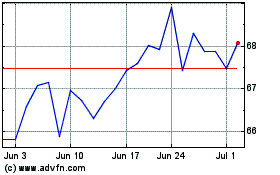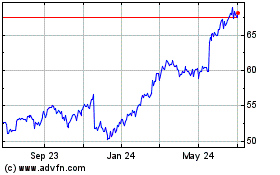Some Employers Stick With Raises Despite Uncertainty on Overtime Rule
December 20 2016 - 9:29AM
Dow Jones News
By Ruth Simon and Rachel Emma Silverman
A Texas judge last month halted an Obama administration rule
that would have made millions of Americans newly eligible for
overtime pay, but some workers are feeling the effects anyway.
Employers Kroger Co., Wal-Mart Stores Inc. and Wendy's Co. say
they are sticking with salary raises and staffing adjustments put
in place to comply with the rule, which had been set to go into
effect Dec. 1 and made workers earning less than $47,476 eligible
for overtime pay.
Companies say they are unwilling to reverse promises they made
to raise employee pay, especially after they spent months
rearranging job duties and wages. At least one firm said that the
approaching rule spurred it to find more efficient ways to use
staff, and appears happy with the result.
The moves suggest that some Obama-era workplace policies may
persist despite challenges from the incoming Republican
administration.
On Nov. 22, federal Judge Amos Mazzant issued an order
temporarily halting the rule while he hears a case from business
owners who say the Labor Department overstepped its authority in
raising the overtime-pay threshold. The department has appealed the
order and the court has granted the department's motion to expedite
its appeal. It is unclear whether the department would continue
with the court case after President-elect Donald Trump takes office
in January.
Grocer Kroger, which employs 431,000 workers nationwide, had
planned to raise the pay of about 4,500 staffers to comply with new
federal overtime rule.
Cincinnati-based Kroger went ahead with its plans, raising pay
for some managers and supervisors earlier this month, because the
company had already told the affected workers that their pay was
going to be raised to the salary threshold, said Mike Schlotman,
Kroger's executive vice president and chief financial officer.
"We felt this was a direct violation of our core values to
communicate with our associates that this was going to take effect
and then not do it because the law changed," says Mr. Schlotman. He
declined to say how much the salary increases would cost the
company, but said it would affect earnings by "less than a penny
per share next quarter."
Brand Value Accelerator LLC plans in January to give 13 of its
59 employees a wage increase or a shift to hourly pay that would
put the company in compliance with the overtime rules, even though
the regulations are now on hold.
Despite the court ruling, "I would have a slimy feeling going
back to them" and undoing the change, said Dylan Whitman, chief
executive the San Diego-based e-commerce marketing company.
Many business owners complained about the impending change, but
Mr. Whitman said he used the coming rules as an opportunity to look
for ways to make his three-year-old company more profitable and
better managed. "If my business is running properly and profitably,
the amount I have to pay on overtime will not be substantial," he
said.
Other small-business owners say that the uncertainty is tougher
than the rules themselves.
"The frustrating and expensive aspect of this issue is not
knowing what to expect," said Chris Corby, CEO of SFM Facility
Management & Maintenance LLC in Nashville, Tenn., in an
email.
Mr. Corby held about a half-dozen meetings to prepare for the
change and polled clients before deciding how to respond.
SFM, a provider of building maintenance and facility management
for churches, private schools and other nonprofits, will stick with
the pay raise it gave one employee in anticipation of the new
regulation; other planned changes that would have affected seven
other workers have been put on hold.
"The whipsaw was so frustrating," Mr. Corby said in an
interview.
Some business owners are taking a wait-and-see approach. Matt
Agosta, CEO of Steele Rubber Products Inc. in Denver, N.C., moved a
half-dozen of his roughly 65 employees to hourly pay in
anticipation of the changed overtime rules.
"We will just wait until we finally figure out what [the
government] will actually do," said Mr. Agosta, whose company makes
rubber parts for classic cars and the street rod market. "There is
no sense in upsetting the cart at the moment."
Nikki Waller contributed to this article.
Write to Ruth Simon at ruth.simon@wsj.com and Rachel Emma
Silverman at rachel.silverman@wsj.com
(END) Dow Jones Newswires
December 20, 2016 09:14 ET (14:14 GMT)
Copyright (c) 2016 Dow Jones & Company, Inc.
Walmart (NYSE:WMT)
Historical Stock Chart
From Mar 2024 to Apr 2024

Walmart (NYSE:WMT)
Historical Stock Chart
From Apr 2023 to Apr 2024
